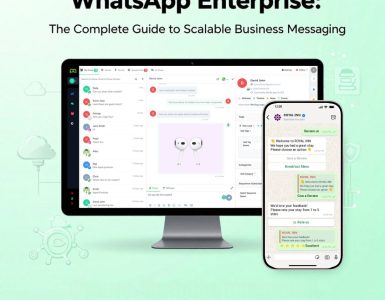Businesses are constantly searching for tools that deliver immediacy, personalization, and scalability. Among these, AI WhatsApp automation has emerged as a powerful lever for transforming how brands engage, support, and convert users. Instead of one-size-fits-all messaging, we now have dynamic, intelligent conversational systems that adapt to user intent, anticipate needs, and drive transactions, all within WhatsApp, the world’s most used messaging app.
What is AI-Powered WhatsApp Automation?
AI WhatsApp automation refers to the use of artificial intelligence, typically Natural Language Processing (NLP) or generative AI; layered on top of automated message systems to handle WhatsApp conversations with minimal human intervention. The AI can understand user input, route queries, trigger workflows, and even autonomously reply to user intents in many cases.
This is distinct from plain “broadcast messaging” or autoresponders: AI enables context, adaptability, and conversational depth.
A few key capabilities:
- Smart replies that infer user intent (for example, mapping “I want to buy” to product pages)
- Drip Sequences and Conversational Funnels that send follow-ups based on user behavior
- Event-driven triggers, e.g., when a user abandons cart, when an order is placed, or a date/time is met
- CRM integration so that each WhatsApp interaction updates customer profiles
- Fallback to human agents in case the AI cannot resolve a query
Picky Assist, a solution provider in this space, supports much of this: it offers AI chatbots, flow building, and connectors to external systems. They even claim that automated flows can accelerate lead conversion by 50%, shorten sales cycles by 33%, and reduce support calls by 80% in certain deployments. Thus, AI-powered WhatsApp automation is not just a tool for messaging, it becomes a strategic communication layer.
Why Does It Matters?
Shift from passive push to conversational pull
In traditional mass messaging (SMS, email blasts), users are passive recipients. But modern users expect conversations, immediate responses, clarity, and context. AI WhatsApp automation meets that expectation: customers “pull” by typing queries, and the system responds intelligently.
24/7 responsiveness at scale
One of the biggest wins is round-the-clock presence. A human support team cannot handle midnight queries or sudden surges. AI automation ensures that basic queries (e.g., “track my order,” “product details”) are handled instantly, reducing friction and wait times.
Cost efficiency and productivity
By automating repetitive interactions, businesses can reduce overhead. According to Picky Assist, deploying AI and automation can reduce support calls by 80% in some scenarios. That means fewer agents needed for tier-1 tasks, freeing resources for high-value work.
Personalization at scale
Manual messaging cannot scale personalization. But AI along with a CRM software enables dynamic personalization: greeting by name, remembering prior interactions, offering product suggestions based on history, etc. This is far superior to generic blasts.
Better engagement and conversion
Conversational interactions drive higher click-through and conversion rates than static messages. AI systems can nudge users toward purchase, follow up after cart abandonment, or suggest cross-sells at the right moment.
Integration with marketing and business systems
AI WhatsApp automation doesn’t live in a vacuum. In well-architected setups, WhatsApp bots “talk” to your CRM, e-commerce system, support ticket system, inventory, and more. Picky Assist’s connectors allow integration with 3,000+ apps.
This means when an order is placed, WhatsApp can send confirmation; when a ticket is open, a follow-up can be triggered; when a lead fills a form, a sequence begins. The conversational channel becomes a central orchestrator.
How Picky Assist Enables This Transformation?
Any discussion of AI WhatsApp automation at scale must include Picky Assist because it’s one of the leading platforms offering this suite of capabilities. Let me highlight how:
- Smart Replies + AI / flow hybrid
Picky Assist supports both AI-driven replies and rule-based flows, so businesses get flexibility. - WhatsApp Web Automation
Its tool lets you pair your WhatsApp web session and send/receive up to 100 messages per minute, with fallback to phone bridging to reduce downtime. - Conversational Funnels & Sequences
You can build drip sequences or multi-step flows to move leads from first interest to conversion using Funnels. - Connectors / integrations
The platform uses Connectors to integrate with 3,000+ apps, letting you trigger messages on events like WooCommerce order change, Google Form submission, etc. - Modular CRM & analytics built in
You don’t need external CRM; Picky Assist has built-in contact management, tags, attributes, filtering, and dashboards. - Broadcasting & segmentation
You can send segmented broadcasts, personalized bulk messages, or targeted campaigns.
By using Picky Assist, you get a unified platform that covers automated whatsapp message, whatsapp automation tool, whatsapp business automation, whatsapp marketing automation, and whatsapp automation for business needs without cobbling separate systems.
Use Cases & Real-World Applications
1. Marketing and Lead Nurturing
- After a lead signs up or downloads a resource, initiate a WhatsApp drip sequence: share a welcome, then product info, case studies, and CTA.
- Based on user replies, route to different branches (e.g. “I’m interested in pricing” vs “I want a demo”).
- Use campaign segmentation: send offers or reminders to engaged segments.
This enables sell on WhatsApp, sell through WhatsApp, sell via WhatsApp strategies more effectively than static blasts.
2. Conversational Commerce / WhatsApp Selling
- Show catalog items, capture orders, process checkout flow, all inside the conversation.
- When users ask “Do you have X product?”, AI can respond, link to catalog, even take payment.
- This is how brands are using whatsapp sales, selling on whatsapp business, and selling products on whatsapp in practice.
3. Customer Support & Self-Service
- Use AI to handle FAQs: order status, refund policies, shipping, sizing, etc.
- When complex issues arise, escalate to live agent seamlessly.
- Trigger follow-ups post support to collect feedback or NPS.
4. Transactional Alerts & Notifications
- Send order confirmations, shipping updates, payment reminders, appointment reminders.
- These messages are triggered automatically by event hooks from back-end systems.
- This helps with sales through whatsapp as the conversation loop remains alive.
5. Re-engagement & Retention
- Reactivate dormant users with messages like “We miss you—here’s a 10% coupon.”
- Post-purchase upsell or cross-sell messages.
- Feedback and review request nudges.
Benefits & Performance Gains
| Benefit | Typical Improvement |
| Faster lead conversion | Up to 50% faster via conversational Funnels |
| Shorter sales cycles | Up to 33% faster sales motion |
| Reduced support load | Up to 80% reduction in call traffic |
| Better campaign ROI | More clicks, more replies compared to email broadcasts |
| Scalability | Handle hundreds or thousands of conversations simultaneously |
| Personalization | Increased customer satisfaction, higher engagement |
| Lower cost per conversion | Fewer manual resources, more automation leverage |
These numbers illustrate why brands are increasingly adopting intelligent WhatsApp systems.
Challenges, Pitfalls & Ethical Considerations
Even though AI WhatsApp automation is powerful, it’s not without challenges. Here are things to watch out for:
1. Overautomation / robotic tone
If your AI responds without empathy or context, users feel frustrated. Always design fallback nodes and conversational personality.
2. Template restrictions & compliance
WhatsApp official API has rules on template messages, user opt-ins, and message windows. Misuse may cause your number to be blocked. Always stay compliant.
3. Balancing human and AI
Some interactions still need empathy, judgment or escalation. Design smooth handoffs to human agents with full context.
Best Practices & Tips for Implementation
To maximize ROI from AI WhatsApp automation, follow these steps:
- Start with use case mapping
Choose a small, high-impact use case (e.g. order status, lead follow-up) and build proof-of-concept. - Design conversations naturally
Use friendly tone, anticipate possible replies and edge cases, including “I can’t understand that, would you like to talk to a human?” - Limit frequency & respect opt-outs
Don’t spam. Provide clear opt-out instructions. - Test & measure continuously
Track metrics: reply rate, conversion rate, fallbacks, drop-offs. Use A/B testing on flows and messages.
If you follow these steps, the risk of “automation gone wrong” diminishes heavily.
To Conclude
AI WhatsApp automation is revolutionizing how brands engage customers on the messaging channel that most users already prefer. From automating support to enabling conversational commerce, it brings speed, personalization, and scalability to customer engagement.
If you’re considering this for your business, here’s a practical path forward:
- Identify a high-impact use case (e.g. order status, lead nurture).
- Prototype with a tool like Picky Assist. Launch a small flow and measure.
- Gradually expand to handling product queries, upsell logic, and support fallback.
- Monitor performance, refine intents, escalate to agents when needed.
Given its potential to reduce support load by 80%, accelerate conversions by 50%, and shorten sales cycles, the ROI can be significant.
Ultimately, AI WhatsApp automation is not about replacing human interaction—it’s about enhancing it, enabling your team to focus on high-value tasks while routine workflows are handled seamlessly.
FAQs on WhatsApp Automation
1. What is AI WhatsApp automation?
AI WhatsApp automation uses natural language processing and workflow logic to automate conversational interactions in WhatsApp. It enables intelligent responses, intent detection, and dynamic message flows with minimal human intervention.
2. Can businesses sell on WhatsApp using automation?
Yes. Automated WhatsApp systems can present catalogs, process orders, and guide users through checkout flows. Many brands now sell through WhatsApp using AI bots and conversational commerce.
3. How does WhatsApp business automation improve customer engagement?
It provides instant responses, personalized messaging, and 24/7 availability. Automated follow-ups and drip campaigns keep users engaged, reducing drop-offs and improving conversion.
4. Is using automation on WhatsApp safe and compliant?
It can be, if done correctly. You must follow WhatsApp’s policies, get user opt-in, use approved message templates, and handle data securely. Always monitor for misuse or spam-like behavior.







Add comment